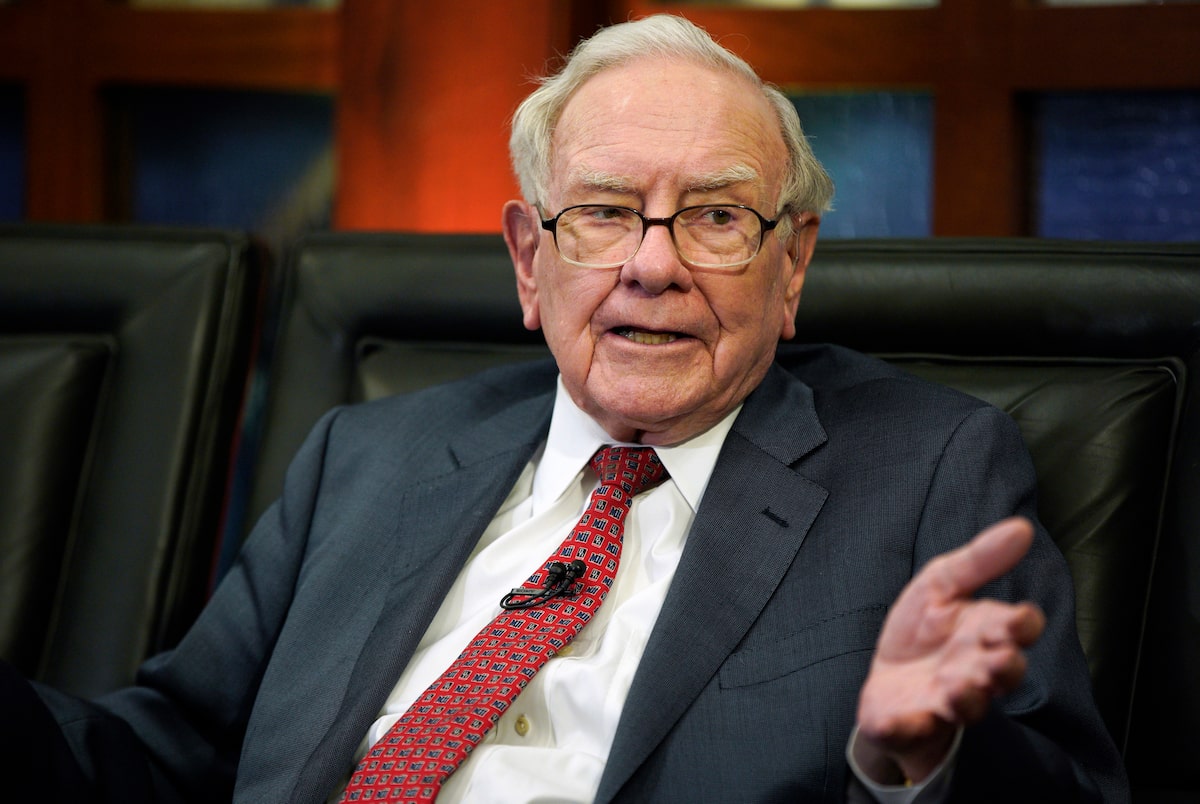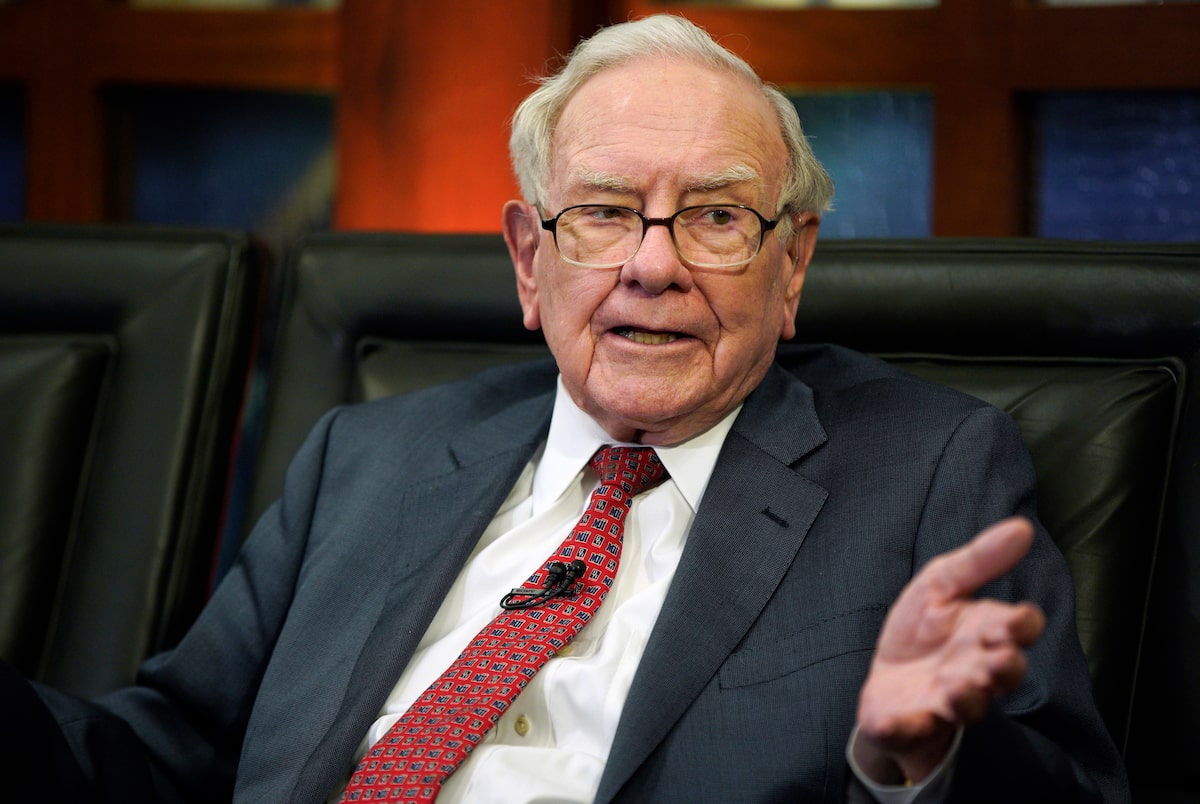Investment
Warren Buffett says AI may be better for scammers than society. And he's seen how – ABC News

[ad_1]

OMAHA, Neb. — Warren Buffett cautioned the tens of thousands of shareholders who packed an arena for his annual meeting that artificial intelligence scams could become “the growth industry of all time.”
Doubling down on his cautionary words from last year, Buffett told the throngs he recently came face to face with the downside of AI. And it looked and sounded just like him. Someone made a fake video of Buffett, apparently convincing enough that the so-called Oracle of Omaha himself said he could imagine it tricking him into sending money overseas.
The billionaire investing guru predicted scammers will seize on the technology, and may do more harm with it than society can wring good.
“As someone who doesn’t understand a damn thing about it, it has enormous potential for good and enormous potential for harm and I just don’t know how that plays out,” he said.
The day started early Saturday with Berkshire Hathaway announcing a steep drop in earnings as the paper value of its investments plummeted and it pared its Apple holdings. The company reported a $12.7 billion profit, or $8.825 per Class A share, in first the quarter, down 64% from $35.5 billion, or $24,377 per A share a year ago.
But Buffett encourages investors to pay more attention to the conglomerate’s operating earnings from the companies it actually owns. Those jumped 39% to $11.222 billion, or $7,796.47 per Class A share, led by insurance companies’ performance.
None of it that got in the way of the fun.
Throngs flooded the arena to buy up Squishmallows of Buffett and former Vice Chairman Charlie Munger, who died last fall. The event attracts investors from all over the world and is unlike any other company meeting. Those attending for the first time are driven by an urgency to get here while the 93-year-old Buffett is still alive.
“This is one of the best events in the world to learn about investing. To learn from the gods of the industry,” said Akshay Bhansali, who spent the better part of two days traveling from India to Omaha.
Devotees come from all over the world to vacuum up tidbits of wisdom from Buffett, who famously dubbed the meeting ‘Woodstock for Capitalists.’
But a key ingredient was missing this year: It was the first meeting since Munger died.
The meeting opened with a video tribute highlighting some of his best known quotes, including classic lines like “If people weren’t so often wrong, we wouldn’t be so rich.” The video also featured skits the investors made with Hollywood stars over the years, including a “Desperate Housewives” spoof where one of the women introduced Munger as her boyfriend and another in which actress Jaimie Lee Curtis swooned over him.
As the video ended, the arena erupted in a prolonged standing ovation honoring Munger, whom Buffett called “the architect of Berkshire Hathaway.”
Buffett said Munger remained curious about the world up until the end of his life at 99, hosting dinner parties, meeting with people and holding regular Zoom calls.
“Like his hero Ben Franklin, Charlie wanted to understand everything,” Buffett said.
For decades, Munger and Buffett functioned as a classic comedy duo, with Buffett offering lengthy setups to Munger’s witty one-liners. He once referred to unproven internet companies as “turds.”
Together, the pair transformed Berkshire from a floundering textile mill into a massive conglomerate made up of a variety of interests, from insurance companies such as Geico to BNSF railroad to several major utilities and an assortment of other companies.
Munger often summed up the key to Berkshire’s success as “trying to be consistently not stupid, instead of trying to be very intelligent.” He and Buffett also were known for sticking to businesses they understood well.
“Warren always did at least 80% of the talking. But Charlie was a great foil,” said Stansberry Research analyst Whitney Tilson, who was looking forward to his 27th consecutive meeting.
Munger’s absence, however, created space for shareholders to get to know better the two executives who directly oversee Berkshire’s companies: Ajit Jain, who manages the insurance units; and Abel, who handles everything else and has been named Buffett’s successor. The two shared the main stage with Buffett this year.
The first time Buffett kicked a question to Abel, he mistakenly said “Charlie?” Abel shrugged off the mistake and dove into the challenges utilities face from the increased risk of wildfires and some regulators’ reluctance to let them collect a reasonable profit.
Morningstar analyst Greggory Warren said he believes Abel spoke up more Saturday and let shareholders see some of the brilliance Berkshire executives talk about.
Abel offered a twist on Munger’s classic “I have nothing to add” line by often starting his answers Saturday by saying “The only thing I would add.”
“Greg’s a rock star,” said Chris Bloomstran, president of Semper Augustus Investments Group. “The bench is deep. He won’t have the same humor at the meeting. But I think we all come here to get a reminder every year to be rational.”
Buffett has made clear that Abel will be Berkshire’s next CEO, but he said Saturday that he had changed his opinion on how the company’s investment portfolio should be handled. He had previously said it would fall to two investment managers who handle small chunks of the portfolio now. On Saturday, Buffett endorsed Abel for the gig, as well as overseeing the operating businesses and any acquisitions.
“He understands businesses extremely well. and if you understand businesses, you understand common stocks,” Buffett said. Ultimately, it will be up to the board to decide, but the billionaire said he might come back and haunt them if they try to do it differently.
Overall, Buffett said Berkshire’s system of having all the noninsurance companies report to Abel and the insurers report to Jain is working well. He himself hardly gets any calls from managers anymore because they get more guidance from Abel and Jain.
“This place would work extremely well the next day if something happened to me,” Buffett said.
Nevertheless, the best applause line of the day was Buffett’s closing remark: “I not only hope that you come next year but I hope that I come next year.” ___
For more AP coverage of Warren Buffett look here: https://apnews.com/hub/warren-buffett. For Berkshire Hathaway news, see here: https://apnews.com/hub/berkshire-hathaway-inc. Follow Josh Funk online at https://www.twitter.com/funkwrite and https://www.linkedin.com/in/funkwrite.
[ad_2]
Source link
Investment
Warren Buffett’s Berkshire Hathaway mulls major new investment in Canada

[ad_1]

Berkshire Hathaway Chairman and CEO Warren Buffett speaks during an interview with Liz Claman on Fox Business Network’s Countdown to the Closing Bell, on May 7, 2018, in Omaha, Neb.Nati Harnik/The Associated Press
Warren Buffett’s Berkshire Hathaway Inc. BRK-A-N has set its sights on making a major new investment in Canada.
The U.S. conglomerate holding company, whose top shareholder is the 93-year-old billionaire, held its annual meeting on Saturday, live-streamed from a packed arena in Omaha, Neb.
Greg Abel, who is vice-chair of Hathaway’s non-insurance operations, is a Canadian who is widely seen to be Mr. Buffett’s successor in the executive suite and eventually become the company’s chair.
Members of Berkshire’s leadership team are now mulling options for a new foray into Canada.
“When we see anything that’s suggesting an idea that’s of a size with interest here and meets other requirements, they don’t have any hesitancy about putting big money in Canada,” Mr. Buffett said during the meeting. “There are things we actually can do fairly well, where Canada could benefit from Berkshire’s participation.”
The Oracle of Omaha heaped praise on Canada. “We do not feel uncomfortable in any way, shape or form, putting our money into Canada,” Mr. Buffett said.
“We don’t have any mental blocks about that country. And of course, there’s a lot of countries we don’t understand at all. So Canada, it’s terrific when you’ve got a major economy – not the size of the U.S., but a major economy that you absolutely, you feel confident about operating there.”
Mr. Abel also serves as chair of Berkshire Hathaway Energy, which includes existing Canadian assets.
Assets north of the border include Calgary-based Berkshire Hathaway Energy Canada, which operates 13,000 kilometres of transmission lines and 300 substations in Alberta through AltaLink.
“It goes across many of our operating entities and then, as Warren touched on, all the businesses that we have a piece of that we’re invested in are up in Canada. So the presence is significant,” Mr. Abel said during the meeting. “We’re always looking at making incremental investments there because it’s an environment we’re very comfortable with.”
Mr. Abel recently received the Canadian Business Leader Award in Edmonton from the University of Alberta, where he graduated with a bachelor of commerce in 1984. At the university, he had plans to major in finance but later switched to accounting.
While it has been four decades since he graduated from the Edmonton university, he still visits friends and family regularly in Alberta, and he continues to monitor the Canadian economy.
“I would say the economy moves very closely to the U.S. So the results we’re seeing out of our various businesses that report both the U.S. and Canadian operations aren’t drastically different,” Mr. Abel said. “On the energy side, for example, we make very substantial investments up there in Alberta. But again, it’s very consistent with how that economy is growing.”
He is the nephew of the late Sid Abel, a hockey Hall of Famer who played for the Detroit Red Wings.
[ad_2]
Investment
Canada-Taiwan investment agreement to boost economic ties – North Shore News

[ad_1]

Last year’s signing of the Foreign Investment Promotion and Protection Agreement (FIPA) is expected to bring Canada and Taiwan closer in economic partnerships, according to experts.
“FIPA is a landmark agreement between Taiwan and Canada,” said Angel Liu, director general of the Taipei Economic and Cultural Office in Vancouver.
“There are some bureaucracies, thresholds or some labour or environmental standards [issues] that, through FIPA, we can facilitate.”
She was among a host of officials and experts from Taiwan speaking late last month at a World Trade Centre Vancouver event. The conference zeroed in on business opportunities in Taiwan and how Canadian companies can capitalize on investment opportunities there following the signing of FIPA this past December.
FIPA helps provide more relaxed investment procedures for businesses making investments in each other’s territory by streamlining the process or foreign regulations and reducing some burdens on the licensing or reviewing process, according to Liu.
The Taiwan government hopes that FIPA will help attract more investments from Canada and deliver the image of Taiwan as a welcoming market for foreign investors, she added.
“It is just the beginning because it takes time for both sides to digest and to get to know each other more.”
There is “huge space” for growth in trade volume and business partnerships between Canada and Taiwan, especially at a time when both countries are looking to reduce their economic reliance on China, according to Huai-Shing Yen, deputy executive director of the Chung-Hua Institution for Economic Research.
Taiwan was Canada’s 12th-largest trade partner in 2022. Canada’s exports to Taiwan accounted for less than 0.5 per cent of its total exports and Canada’s imports from Taiwan accounted for one per cent.
“This suggests that Taiwan is not yet considered as a main supply source for Canada and the same situation applies the other way around,” said Yen.
She said the bilateral investment between both countries is also “lower than ideal” as Canada accounted for 0.1 per cent of the foreign investment in Taiwan over the past 10 years. And some areas have significant potential for growing trade and partnerships between Taiwan and B.C.
“The first potential is for agricultural products. And the second potential I would say is about the critical mineral supply, because Taiwan has a growing demand of some critical raw materials on which we want to diversify our import suppliers,” she said.
There are about 30 critical raw materials that Taiwan is highly dependent on China, and Canada has great potential to become Taiwan’s new partner in mineral supply, she added.
Information and Communications Technology (ICT) is another sector Taiwan companies are looking to relocate their investment to countries other than China.
“I understand that Canada wants to develop a strong ICT industry and it’s also an important area B.C. would like to further develop. … We can provide the ICT products and also can be your new source of ICT investments in B.C. as well as in Canada,” said Yen.
Liu said FIPA is a great step further but she also hopes the Canadian government seriously considers Taiwan’s application to join the Comprehensive and Progressive Agreement for Trans-Pacific Partnership (CPTPP) to unlock more trade and investment opportunities between the two countries.
“[We] encourage CPTPP members, including Canada, to start informal discussion and negotiations with Taiwan, so we can at least start the negotiation informally.”
[ad_2]
Source link
Investment
Avoid These 2 Stocks in 2024, But Consider Investing in This 1 Instead!

|
|
[ad_1]

Utility stocks are supposed to be safety nets or defensive assets, but not when interest rates are sky-high. Thus far, the sector is one of three worst performers in 2024. TransAlta (TSX: TA) and Boralex (TSX:BLX), in particular, own renewable energy assets and pay decent dividends yet continue to underperform.
Avoid both dividend stocks and instead consider investing in Secure Energy Services (TSX:SES) in the industrial sector, the third best performing sector. In addition to the market-beating return (+22.1%), the yield is more attractive, and the payout is safe.
Evolving markets
TransAlta’s earnings attributable to shareholders in Q1 2024 beat expectations, although it declined 24.5% to $222 million compared to Q1 2023. Furthermore, free cash flow (FCF) and cash flow from operating activities fell 21.7% and 47.2% year over year respectively to $206 million and $244 million.
The $3 billion company operates electrical power generation assets in Canada, the United States, and Australia. It provides clean and reliable power to municipalities, medium and large industries, businesses, and utility customers. TransAlta is one of Canada’s largest wind power producers and Alberta’s largest hydroelectric power producer.
Since green development is on hold in Alberta, management will focus on other core jurisdictions, such as the U.S. and Western Australia, to secure risk-adjusted returns within stable markets. At $9.84 per share (-10.1% year to date), the dividend offer is 2.44%.
Robust pipeline
As of this writing, Boralex investors are down 10.7% year to date but partake in the 2.21% dividend. The share price of $29.92 is higher than TransAlta and Secure Energy Services. This $3.1 billion power company develops wind, solar, and hydroelectric energy production facilities and owns energy storage sites in Canada, France, the U.K., and the U.S.
In 2023, net earnings soared 1,337.5% to $115 million versus 2022 due to strong wind farm performance and asset commissioning in France. Discretionary cash flows increased 7.2% year over year to a record $179 million. Still, the record results don’t show on the stock’s performance. The trailing one-year price return is -22.3%.
Patrick Decostre, President and CEO of Boralex, said two major projects are ongoing, with commissioning in Q4 2024. Two secured-stage projects are progressing according to plan. The company submitted bids (solar and storage) in New York. “We can successfully complete these various projects, which are spread over the next several years,” he said.
Strong industry fundamentals
Secure is in ann environmental and energy infrastructure business that operates in the waste management industry. The network of this $3 billion company extends throughout Western Canada and North Dakota. 2024 could be a banner year, given the impressive first-quarter results.
In the three months ended March 31, 2024, revenue declined 13% year over year to $360 million, while net income climbed 667.3% to $422 million compared to Q1 2023. Secure sold 29 facilities to Waste Connections for $1.2 billion on orders by the Competition Tribunal.
Management said Secure is extremely well positioned for success due to strong industry fundamentals and growth opportunities. The expanded Trans Mountain pipeline will soon begin operations. Furthermore, the waste processing facilities currently only operate at about 60%.
More than secure
Secure Energy is a winning investment, evidenced by the 188% return in 3 years. At $11.41 per share, the 3.51% dividend yield is safe owing to the low 20.6% payout ratio.
[ad_2]





